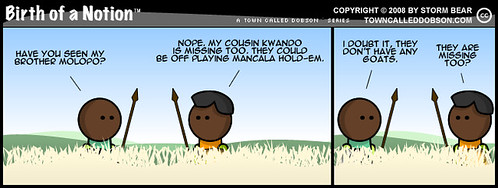Crossposted from Left Toon Lane, Bilerico Project & My Left Wing

click to enlargeThe transatlantic slave trade was the trade of African people supplied to the colonies of the "New World" that occurred in and around the Atlantic Ocean. It lasted from the 16th century to the 19th century. Most slaves were shipped from West Africa and Central Africa and taken to the New World (primarily Brazil). Some slaves were captured by European slave traders through raids and kidnapping, but most were obtained through coastal trading with Africans. Most contemporary historians estimate that between 9.4 and 12 million Africans arrived in the New World, although the number of people taken from their homestead is considerably higher. The slave-trade is sometimes called the Maafa by African and African-American scholars, meaning "holocaust" or "great disaster" in Swahili. The slaves were one element of a three-part economic cycle—the Triangular Trade and its Middle Passage—which ultimately involved four continents, four centuries and millions of people.
But before the slave trade, thousands of years before the New World was discovered there was a game called Mancala (also called Oware, Bao and many other names). It is an abstract strategy game that originated in Africa and predates Chess and its predecessors. Game boards have been found carved in stone all up and down the Egyptian temples that lined the Nile, including the Temple of Karnack. It is a wholly mathematical game - its more complex versions have as much scope as Chess, despite its primitive origins.
From Oware.org:
The diffusion of pit and pebble games throughout the world from Africa can be explained by the migration of African people to various parts of the world, both voluntary and forcefully as in the case of the Trans-Atlantic and Eastern slave trades from Africa. This is confirmed by the use of the same rules in parts of West Africa and the Caribbean. It is played all over the world from the Far East, Middle East, Asia, Africa, to the Caribbean. There is even evidence to prove that it was and may be still played in its traditional form in some southern states of America and in some of the former Soviet states.
There are many versions of pit and pebble games, over 300 in all, having differing rules. Three major types exist, distinguished by the number of rows on the board. Two row boards are the most popular of which Oware is an example. These games can have a varying number of pits along the board from 5 to 14, but the 6 pit long board is the most common, played predominantly in West Africa and the Caribbean. Bao is an example of the Four-row type; these have other names depending on the version. You will find these played mainly in East and South Africa. Three-row type such as Gebeta is the least popular and is confined to Ethiopia and Eritrea to our knowledge.
Oware or variations of this name is the most popular name the game is known by, i.e. the 2x6 type. Examples of these are Warri, Awale, Awele, Awari and many more. Oware is the name given to the game by the Akan speaking people of Ghana. Even this name is a generic name, with at least three versions being covered by this generic name. Traditionally and today the version that has been used in competitions is known as Abapa (literally translated as the 'good version'). Abapa has always been known as the adult's version, played by those who have graduated from playing Nam-nam the children's version.
In Ghana, Oware has always occupied a prominent role in society being regarded as a game of the Kings of Asante and Denkyira. It was played on beautifully carved Ivory boards in the shape of a stool embellished with gold. So engrained was it in society that it even had its own social taboos. At times it was used in the Coronation ceremony of the Kings of some African communities. There exists an Ashanti legend, which explains the origin of Oware. It says that in order for a man and a woman to have more time to play the game, they decided to get married. Warri being the Akan word for being married.
As a social tool Oware is never a game between two people, but has always been a game involving all who witness it. Spectators will usually give advice and join in the banter that is synonymous with the game. In areas of the world were it has been traditionally played it is used as a focal point for people to meet entertain themselves and pass time. Leaders used it as a means to hone their leadership skills and get to become more acquainted with their people.
For thousands of years Oware has been used as an educational tool for children in Africa and all over the world. In the past 400 years this aspect of its history has been brought to the attention of Europeans through various researchers and observers who had an interest in the game for various reasons. Many academic authorities and educationalist have trumpeted the educational value of the game and have called for it to be utilized in schools. Today it has been recognized as a very useful educational tool and is being taken up by an increasing number of schools. |









0 comments:
Post a Comment